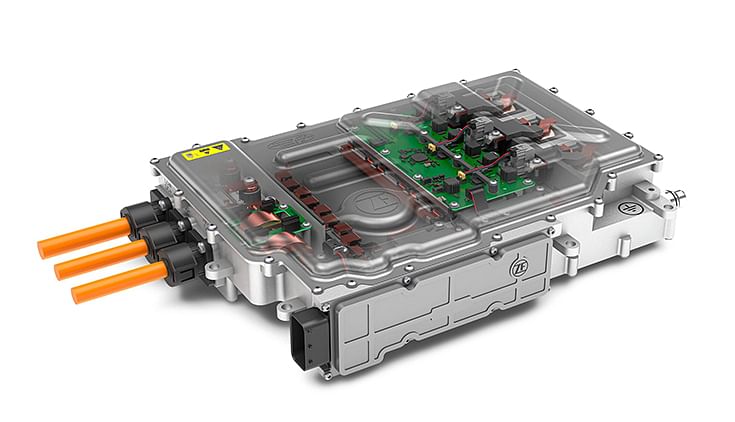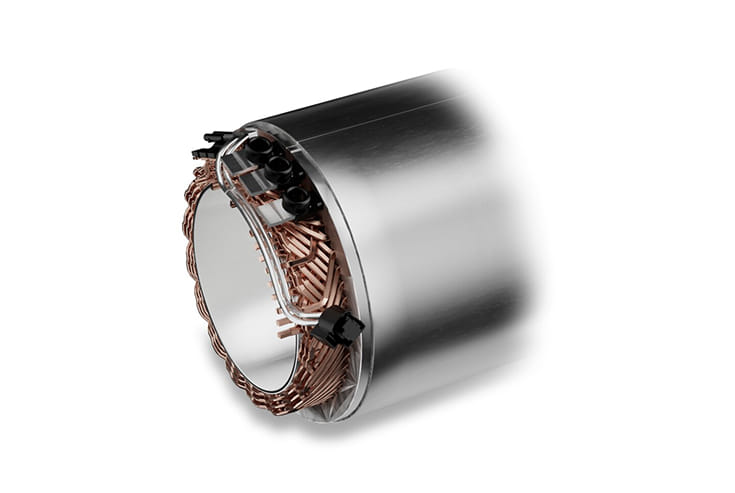ZF rolls out new e-drives for passenger cars and CVs
Claims excellent power density and efficiency in overall system comprising e-motor, power electronics, transmission and software; highest order backlog for e-drives with a volume of 25 billion euros
ZF has announced the latest generation of electric drives for passenger cars and light commercial vehicles. The technology major says “it sets standards through outstanding power density and energy efficiency through numerous innovations at both the component and system level.”
These include the compact design of the drives, the ‘discrete approach’ in power electronics, and a resource-saving use of materials, which also makes the production of the drives more sustainable. With their modular concept, the new ZF e-drives support automotive manufacturers in customising the further electrification of their entire model range. For end customers, the new technologies offer higher efficiency, more power, and shorter charging times, says ZF.
System approach to tap emerging EV trends
ZF is already developing its comprehensive product range for pure e-drives with a view to the functions desired by customers and end users. In order to better and faster meet the highly diversified market demand, the technology Group is now presenting a new generation of electric drives based on a modular overall concept with electric motor, inverter, transmission, and software.
"We are focusing on three basic systems that meet our customers' main requirements, namely efficiency, performance and cost, even in the standard version," said Markus Schwabe, Product Line Manager Electrified Powertrain Systems. "On this basis, we can optimally implement further individual customer requirements in e-vehicles of all segments."
"The great interest of manufacturers in our products in both the passenger car and commercial vehicle sectors is confirmed by our high order backlog in the high-voltage business. With the next generation of electric drives, we are consistently continuing our strategy of developing sustainable and efficient mobility for the future," added ZF Board of Management member Stephan von Schuckmann, who is responsible for e-mobility within the Group.
Innovation in the system as well as components
With the new generation of e-drives, ZF provides fully integrated electric drive systems. With its high level of interface expertise and unique know-how for driving strategies, its application engineers can meet customer requirements fully in the best possible way. However, the Group will also offer the innovative components individually, on which its own system solution is based. "Thanks to sophisticated internal interfaces, the new, extremely compact design allows system or component adaptations to be made with little effort. In addition, the design has very high structural rigidity, which enables superior noise behavior," explained Dr. Otmar Scharrer, Head of Development for Electric Drive Technologies.
The new generation of ZF e-drives will be available on the market as a complete system starting in 2025; ZF will bring individual components into series production earlier. The following innovations at component level make their contribution to the advanced overall system: ZF claims its new high-voltage converter achieves an efficiency of 99.6 percent.
ZF claims its new high-voltage converter achieves an efficiency of 99.6 percent.
With ‘discrete package technology’, power electronics manage the balancing act between a high degree of component uniformity and high adaptability. The individualisation takes place at the chip level: A discretely structured ZF inverter is built with individual power semiconductor switches. This modularity offers better performance scalability than is possible with complex power modules. In addition, ZF's ‘discrete package technology’ requires fewer types of components than using conventional power modules. "With our new approach to power electronics, we can serve different market requirements faster and more precisely," explains Scharrer.
The new, highly integrated e-motor increases the power density compared to the technology currently available in the market. A new cooling concept and a new winding technology play the decisive role here. Thanks to the new cooling concept, oil can flow directly around the copper rods – exactly at the point where most heat is generated during operation.
 ZF's new e-motor with new cooling concepts and new winding technology. The picture shows the stator with the new braided winding.
ZF's new e-motor with new cooling concepts and new winding technology. The picture shows the stator with the new braided winding.
Such highly efficient cooling significantly increases performance with the same weight and installation space. The continuous power of the electric motor is increased to up to 85 percent of the peak power. In addition, the use of heavy rare earths can be largely dispensed with, and the e-motor can thus be produced more sustainably. The braided winding technology developed by ZF, a further development of the ‘hairpin’ winding, enables a total of 10% less installation space. The winding head alone is around 50% smaller than with conventional approaches. This means that around 10% less raw material is processed.
With its new coaxial reduction gearbox, ZF has transfered its world-leading know-how in planetary gearboxes to the next generation of electric drives. Two integrated planetary gears not only generate the desired axle ratio, but also include the fully integrated differential function.
Compared to common offset concepts, the new solution reduces weight and installation space requirements without compromising efficiency, noise, and vibration.
High-voltage converters (DC-DC converters) play a central role in fuel cell-powered electric drives. They compensate for the low output voltage and the strong voltage drop at high load of the fuel cells. The new high-voltage converter from the ZF power electronics platform, which was developed for passenger car and commercial vehicle applications, has a top value of 99.6% in terms of efficiency.
RELATED ARTICLES
Autoliv Plans JV for Advanced Safety Electronics With China’s HSAE
The new joint venture, which is to be located strategically near Shanghai and close to several existing Autoliv sites in...
JLR to Restart Production Over a Month After September Hacking
Manufacturing operations at the Tata Group-owned British luxury car and SUV manufacturer were shut down following a cybe...
BYD UK Sales Jump 880% in September to 11,271 units
Sales record sets the UK apart as the largest international market for BYD outside of China for the first time. The Seal...






 By Autocar Professional Bureau
By Autocar Professional Bureau
 22 Nov 2022
22 Nov 2022
 6021 Views
6021 Views














 Ajit Dalvi
Ajit Dalvi




